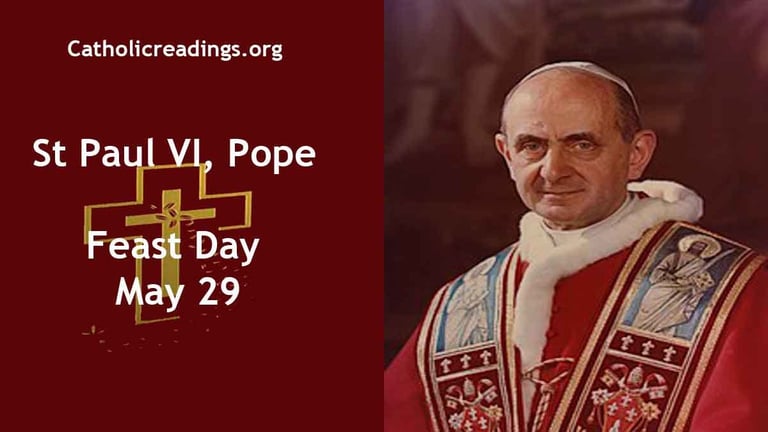Saint of the day May 29, 2025
Pope St. Pius VI
DAILY SAINT
Nirmala Josephine
5/29/20252 min read


Born on September 26, 1897, in Concescio, Italy, Giovanni Battista Montini was raised in a middle-class family of five. Although Giovanni’s father was a lawyer and journalist, Giovanni suffered from ill health growing up, and was educated at home for much of his youth. After completing his initial studies at a school in Brescia, he was ordained at the age of 23, and sent by the bishop to Rome for further studies in literature, philosophy, and canon law.
Upon completion of his graduate studies, he became part of the Vatican Secretariat of State. Giovanni worked there for 30 years, using his position to support Jews and refugees during World War II, as well as serving as chaplain to the Federation of Italian Catholic University students. He worked as papal undersecretary of state and became acting secretary for ordinary (nondiplomatic) affairs in 1944, and 10 years later was appointed archbishop of Milan. During his time as archbishop, Giovanni made it a personal mission to visit factories and reach out to laborers who had grown indifferent in their faith, calling himself “archbishop of the workers.” Four years later, Pope John XXII made him a cardinal, and he served in that role until he was elected pope on June 21, 1963, when he took the name Paul VI.
Soon after his election, Pope Paul VI guided the final three sessions of the Second Vatican Council and oversaw the fulfillment of its new decisions throughout the Church. Though at times he was criticized for a lack of assertiveness, others saw his attitude as an indicator of his thoughtfulness and diplomacy while guiding the Church through a difficult new era, as he did his best to maintain its traditions while ensuring its effectiveness in a rapidly changing world.
Pope Paul VI’s time in office was not without controversy. Perhaps his most contentious act occurred when he wrote the encyclical “Humanae Vitae,” affirming the Church’s stance against artificial birth control. He was also criticized for reaffirming celibacy for priests. While in office, Pope Paul VI instituted many changes to the Church offices, including founding the World Synod of Bishops, enabling more countries to have their own cardinals, and placing age limits on certain positions. He was also the first pope to institute the practice of Apostolic Journeys, taking nine international trips over the course of his reign and making the first papal trip to the continent of Asia.
After just over 15 years in office, Pope Paul VI passed away at Castel Gandolfo on August 6, 1978. He was beatified on October 19, 2014, and canonized on October 14, 2018. He left behind a legacy of ecumenicism and caring for workers and the poor.
Reflection
Pope Saint Paul VI was one of the first popes to face the many challenges and blessings that have come from modernization. He sought to keep the ancient faith of the Church ever ancient while also making it ever new and relevant to a world in need. He sought unity among Christians, peace among nations, and respect for the dignity of all. As we honor this recent saint, ponder the effects that he has directly had upon your life. His prayerful decisions, especially regarding the way we celebrate the liturgy, have led many to engage the sacraments in a more active way, participating more fully in the sacred offering of the Most Holy Body and Blood of Christ to the Father in Heaven. Nothing in life is more important than that.
